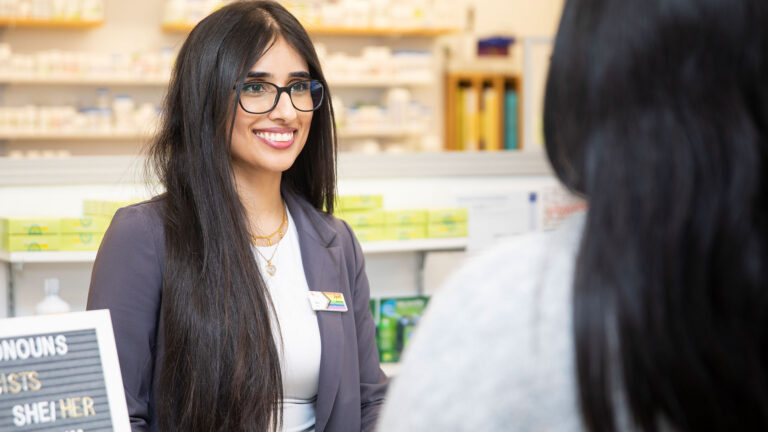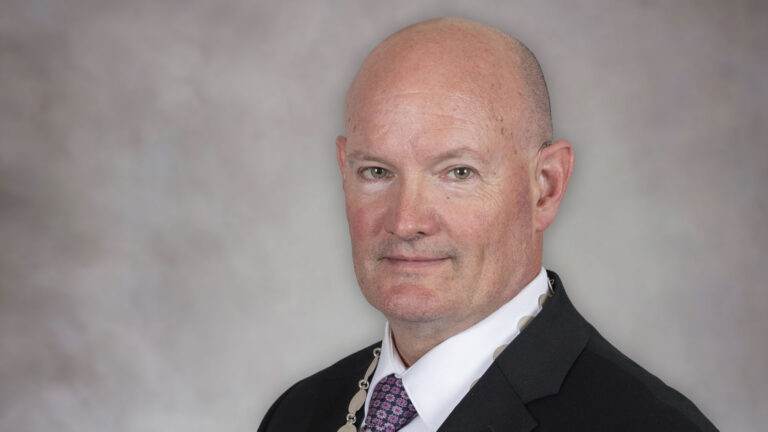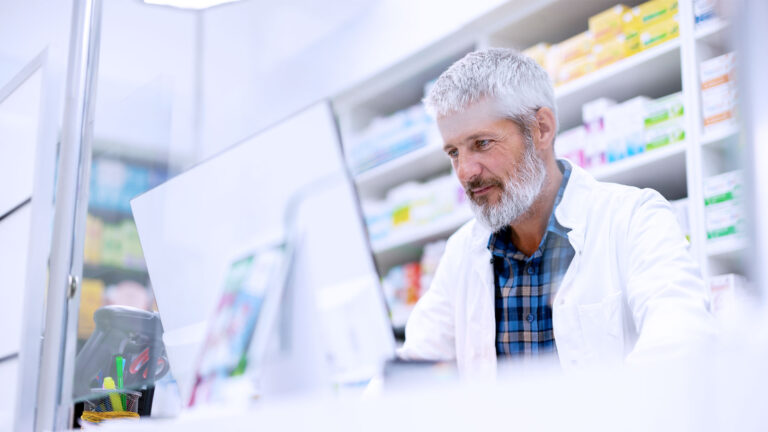
The below article was published in ACP’s 2024-24 annual report. Read the full annual report on the ACP website.
Jen Garvie has been a patient at Medi-Drugs Millcreek Pharmacy in Edmonton for over two years.
“Coming here, I was taken at face value for who I am without having to worry,” she said.
For Jen, interacting with the health system as a transgender woman has been an ongoing source of anxiety and stress, but her experience at Medi-Drugs Millcreek was a welcome change.
“When I started coming here, it had been quite some time of not taking care of myself regularly,” said Jen. “Knowing that there was safety and comfort here and having professionals who believe in diversity and equity and took me for who I was just made a world of difference and melted away years of anxiety about interfacing with the health system.”
Jen is one of many patients who have found a safer space at Medi-Drugs. Harjyot (Jyoti) Palak is the licensee at Medi-Drugs Millcreek, and she explained that their pharmacy continually strives to be a safer space for 2SLGBTQ+ patients.
“One of my core beliefs is that everyone deserves the same standard of care. You can’t achieve that without being inclusive and equity driven, and ensuring that marginalized groups are supported,” said Jyoti. “We strive for everyone to feel comfortable and safe because health care isn’t just for cisgender heterosexual people—everyone deserves to be respected and cared for.”
Jen said that, often, trans people are dissuaded from pursuing care due to the judgement and lack of support they experience in some healthcare settings.
“There’s a lot of inherent bigotry that can end up being instituted throughout any kind of healthcare provision process whether its administratively or front of line or anywhere in between,” said Jen. “You can have very disastrous end results ranging from prolonged and unnecessary discomfort all the way through to death.”
To illustrate one example of what trans people experience in the health system, Jen referenced trans broken arm syndrome.
“This theory illustrates what trans people will face in different parts of the health system,” said Jen. “It goes something like this: I go to emergency because I have a broken arm. I share my list of gender-affirming medications through the intake process. When I see the attending physician, he says, ‘It appears you have a broken arm.’ I explain what happened, how I fell and hurt my arm. He responds, saying ‘It seems it was probably the estrogen that did it.’”
Trans broken arm theory is a documented form of medical discrimination faced by transgender and gender diverse patients wherein a provider incorrectly assumes that a medical condition results from a patient’s gender identity or medical transition.1 Jen said this type of experience is all too common.
“I wish I was kidding, but that’s very truthfully the case.”
Jen and Jyoti agree that inclusive care, where providers have a meaningful understanding of the 2SLGBTQ+ experience, can have life-changing and life-saving impacts for patients.
“If you have trust in your healthcare provider, you are more likely to seek the care you need,” said Jyoti. “If you don’t feel safe, if you think it’s going to be a discriminatory or derogatory experience, you might not seek care and try to just deal with things on your own.”
Jen agrees that, for 2SLGBTQ+ patients, a safer and more inclusive environment supports better overall health.
“The more comfortable that you feel with being safe in any kind of inclusive healthcare environment, you will probably be more encouraged to do things to take care of yourself a little bit better,” said Jen.
Jyoti added that inclusive care leads to improved health outcomes for patients because it is about caring for the patient holistically.
“There’s this idea that inclusive care is only about hormone therapy and that’s just not the case,” she said. “Inclusive care is about caring for and respecting the person in front of you—from chronic disease management, to managing blood pressure or diabetes, to offering vaccines. It’s not just hormones. Inclusive care doesn’t mean specifically offering gender-affirming therapy— it encompasses a lot more than that.”
When it comes to the question of “how,” Jyoti said a little can go a long way into creating safer and more inclusive spaces.
“I think one of the biggest hesitancies for pharmacy teams to adopt inclusive practice is that there will be this insurmountable mountain of work and so much you have to do,” said Jyoti. “Little things like having well-vetted resources displayed, a gender-neutral accessible bathroom space, and pronouns on nametags can really go a long way. It can be something as simple as asking someone’s pronouns and asking which name they go by.”
Jyoti added that their computer software includes a space for patients to indicate their pronouns and they take time as a team to discuss how to ask for pronouns and what gender-neutral language looks like in practice.
“It’s really just about breaking down some of the notions that we’ve learned living in a heteronormative, cis-normative society,” she said. “For example, we try to use gender-neutral language like ‘parent’ and ‘child’ instead of ‘mother’ or ‘father’ and ‘daughter’ or ‘son,’ in an effort to not make assumptions.”
Jyoti stressed the importance of ensuring the work towards creating inclusive spaces goes beyond surface level changes.
“There is real harm when healthcare professionals misgender patients or use their former names,” said Jyoti. “In the same way we understand the harms of medication errors, as pharmacy professionals, we need to recognize the importance of respecting patients’ identities and avoid the harms of not doing so.”
Jen is one of many patients who have benefited from one pharmacy team’s effort to make their space safer and more inclusive in a meaningful way.
“What makes coming here so wonderful is that they provide care with their hearts and you can tell that they really do care,” said Jen. “Coming here, you get treated like a human being and you get the respect and the dignity that you deserve.”
- Social Science & Medicine. Trans broken arm syndrome: A mixed-methods exploration of gender-related medical misattribution and invasive questioning. https://www.sciencedirect.com/science/article/abs/pii/S0277953623001041?via%3Dihub ↩︎




